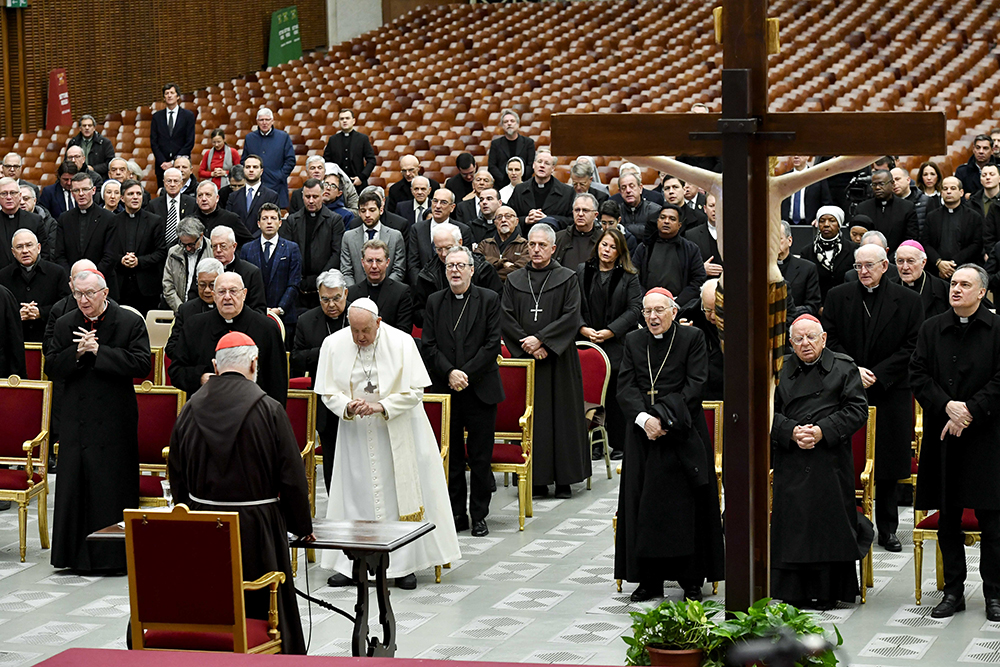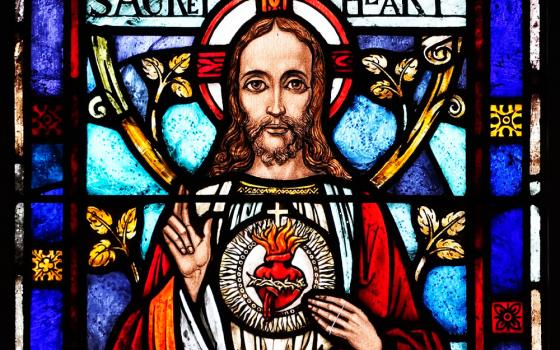
Cardinal Raniero Cantalamessa, preacher of the papal household, presents an Advent meditation for Pope Francis, officials of the Roman Curia and Vatican employees in the Paul VI hall at the Vatican Dec. 15. (CNS/Vatican Media)
Jesus does not wait for sinners to change their lives before he welcomes them, said the preacher of the papal household.
"He welcomes them and this leads sinners to change their lives," Cardinal Raniero Cantalamessa told Pope Francis, top Vatican officials and Vatican employees in the Paul VI Audience Hall.
"God's mercy, in fact, is without conditions, but it is not without consequences!" he said.
Cantalamessa, preacher of the papal household, gave the first of his 2023 Advent reflections to the pope and his aides Dec. 15, focusing on St. John the Baptist and the new evangelization. No Friday meditations were given the first two weeks of Advent as the pope had been scheduled to be in Dubai, United Arab Emirates, Dec. 1 and Dec. 8 was the feast of the Immaculate Conception.
"At the basis of the baptist's preaching is the statement: 'Repent and thus the kingdom of God will come to you!' At the basis of Jesus' preaching is the statement: 'Repent because the kingdom of God has come to you!' " the cardinal said.
"It is not the observance of the commandments that allows the kingdom of God to come; but it is the coming of the kingdom of God that allows the observance of the commandments," he said.
"People did not suddenly change and become better, so that the kingdom could come to them. No, they are the same as always, but it is God who, in the fullness of time, sent his Son, thus giving them the possibility of changing and living a new life," he said.
The "newness of Christ is reflected in the different attitude of the baptist and Jesus toward the so-called 'sinners.' John, we have seen, attacks sinners who come to him with fiery words" while Jesus speaks and eats "with tax collectors and sinners."
Advertisement
"Jesus does not wait for the Samaritan woman to put her private life in order before spending time with her and even asking her to give him something to drink. But in doing so he changed the heart of that woman who became an evangelizer among her people," Cantalamessa said, noting that the same thing happened with Zacchaeus, Matthew the publican and the adulteress.
"We cannot draw an absolute norm from these examples," he said, because Jesus could read people's hearts. "We are not Jesus," but "the church cannot ignore, however, the style of Jesus or place it on the same level" as that of St. John the Baptist.
"Jesus disapproves of sin infinitely more than the most rigid moralists could do, but he proposed a new remedy in the Gospel: not distancing, but acceptance," he said.
"Changing one's life is not the condition for approaching Jesus in the Gospel; however, it must be the result — or at least the purpose — after approaching him," he said.
The cardinal said the Catholic Church "has much to learn from today's mothers and fathers" who continue to respect and love their children even when they "destroy themselves" with addictions, abuse or bad choices. "We are called to choose between the model of John the Baptist and the model of Jesus, between giving pre-eminence to the law, or giving it to grace and mercy."
St. John the Baptist is not just a moralist and a preacher of penance, the cardinal said, he is a special prophet who points to the savior who has already come.
This is "the new Christian prophecy, which does not consist in announcing a future salvation, but in revealing the hidden presence of Christ in the world," he said.
Jesus said, "I am with you always until the end of the world" and he continues to be among humanity, but the world even today, after two thousand years, still does not recognize him, the cardinal said.
The prophetic task of the church is the same as that of St. John the Baptist, he said, "to shake each generation from its terrible distraction and blindness that prevents it from recognizing and seeing the light of the world."
During St. John the Baptist's time, people were scandalized by the humble, human, "physical body of Jesus; from his flesh so similar to ours, except in sin," he said.
Today, what scandalizes is "his mystical body, the church, so similar to the rest of humanity, not even sin excluded," Cantalamessa said.
But, he said, "just as John the Baptist made his contemporaries recognize Christ under the humility of the flesh, so it is necessary today to make him recognized in the poverty of the church — and in the poverty of our own lives."







